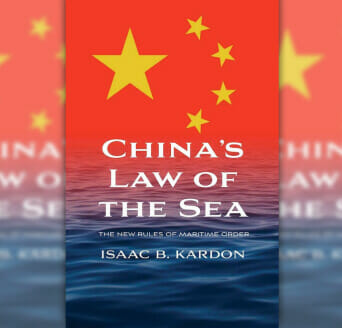On Tuesday, April 18, the Asia Policy Program, Clements Center for National Security, Strauss Center for International Security & Law, UT NROTC, and Center for East Asia Studies (CEAS) will host Isaac B. Kardon, Senior Fellow for China Studies at the Carnegie Endowment for International Peace and former Assistant Professor in the Center for Naval Warfare Studies at the U.S. Naval War College & Senior Fellow at the Carnegie Endowment for International Peace, to discuss his latest release China’s Law of the Sea: The New Rules of Maritime Order at 12:15 PM at RLP 1.302B, Robert L. Patton Hall. This talk will be moderated by Dr. Sheena Chestnut Greitens, founding Director of the Asia Policy Program and Associate Professor at the LBJ School of Public Affairs. The Asia Policy Program is a joint effort of the Clements Center for National Security and the Strauss Center for International Security and Law.
An in-depth examination of the law and geopolitics of China’s maritime disputes and their implications for the rules of the international law of the sea.
China’s Law of the Sea is the first comprehensive study of the law and geopolitics of China’s maritime disputes. It provides a rigorous empirical account of whether and how China is changing “the rules” of international order—specifically, the international law of the sea.
Conflicts over specific rules lie at the heart of the disputes, which are about much more than sovereignty over islands and rocks in the South and East China Seas. Instead, the main contests concern the strategic maritime space associated with those islands. To consolidate control over this vital maritime space, China’s leaders have begun to implement “China’s law of the sea”: building domestic legal institutions, bureaucratic organizations, and a naval and maritime law enforcement apparatus to establish China’s preferred maritime rules on the water and in the diplomatic arena.
Isaac B. Kardon examines China’s laws and policies to defend, exploit, study, administer, surveil, and patrol disputed waters. He also considers other claimants’ reactions to these Chinese practices, because other states must acquiesce for China’s preferences to become international rules. China’s maritime disputes offer unique insights into the nature and scope of China’s challenge to international order.



